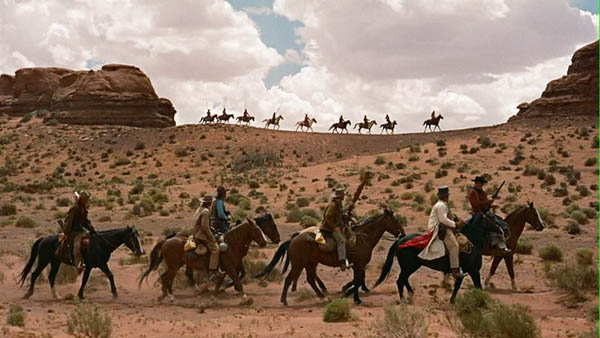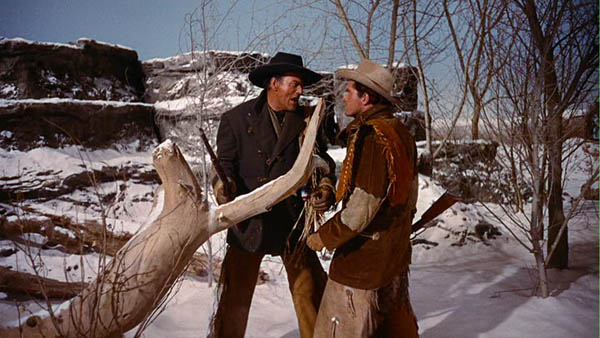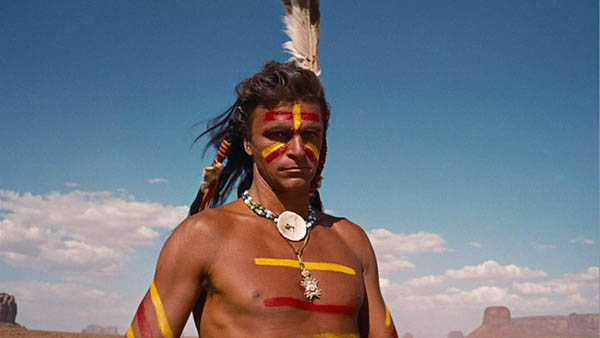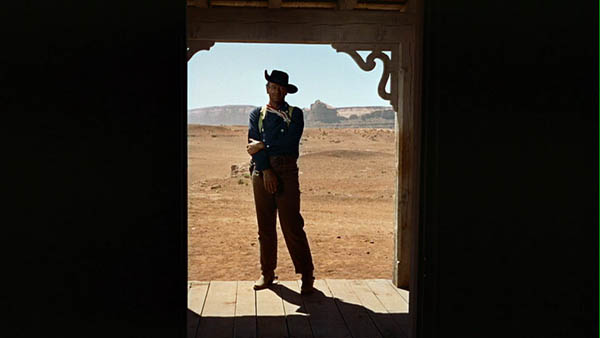Still not so sure I understand the auteur-stamp of Howard Hawks (some characteristics of which were discussed after watching His Girl Friday). But gosh does he make entertaining movies. Both of these built up tension and excitement, then came up with improbably happy endings for our heroes.
To Have and Have Not (1944)
A few years after His Girl Friday, same year as Wilder’s Double Indemnity. Novel by Hemingway, adapted by Faulkner – that’s some writing credentials. Bogart, so soon after Casablanca, is again trying to stay coolly neutral in a tense city occupied by wartime Vichy France (Martinique this time), falling for a girl who’s trying to skip town. This time the girl is smoky, deep-voiced Lauren Bacall (her first movie) and Bogie’s drunk friend and partner in his fishing boat business is triple oscar-winner Walter Brennan of Lang’s Fury & Hangmen Also Die. Clearly a great character actor, Brennan spiced up both movies considerably.
Bogie has been taking an obnoxious customer out fishing all week, catches Lauren picking the guy’s pocket before Bogie has been paid, but all is forgiven when guy catches a stray bullet during a police raid at their favorite hangout bar (a secret meeting place for the anti-Vichy free French underground). Now broke with no customer, Bogie takes a job ferrying a French couple in his boat, then helping the guy when he gets his stupid self shot. Suspecting Bogie’s involvement, the nazi collaborators hold Eddie (that’s Walter Brennan) hostage and refuse him alcohol until Bogie gives up the hostages. This is the point when I decided the movie is not trying to be grimly realistic. I hadn’t felt any sense of danger or suspense so far, not even when the boat was shot at, and now this kidnapping has hardly begun when Bogie shoots a guy through his desk, turns the tables on the baddies and escapes with the girl. He’s sort of an untouchable superhero version of his Casablanca character, and he’s got a sexier, younger and more independent woman.

Bacall sings with Hoagy Carmichael in the “Sam” role. Hoagy wrote “Georgia On My Mind” (for real, not in this movie).
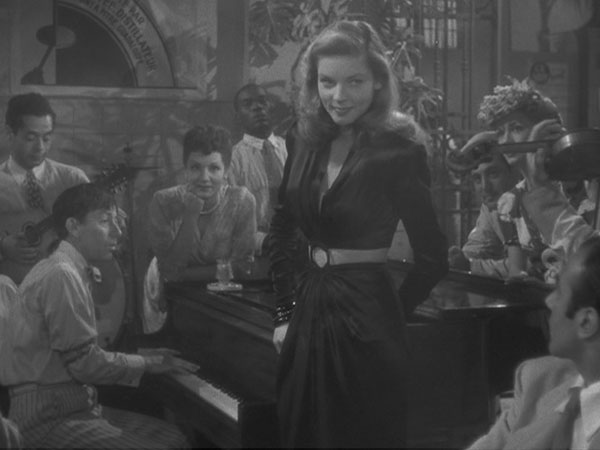
Frenchy – the clockwork-loving party host of Rules of the Game – works the hotel bar and helps protect and organize the resistance.

Johnson, Bogie’s customer, is rear-projection fishing. Looks like fun – and it’s six decades before the Nintendo Wii was invented.

Walter Brennan manages to be a funny drunk without being a typical W.C. Fields-ish classic Hollywood drunk. In fact, he’s the most believable guy in the movie.

–
Rio Bravo (1959)
I guess I’m spoiled, since the only westerns I’ve watched in five years are this one, The Searchers, and those Budd B. pics from last week – none of the standard-quality workman stuff which everyone watching this in ’59 would’ve seen, nor the 50’s hits this was supposedly reacting against (3:10 to Yuma and High Noon). The Searchers had a darker edge to it, while this one has a giddy, explosive shootout ending in which the heroes are hardly in any danger, just a buncha bonkers western fun. Wasn’t expecting that.
One of the last films by Hawks, less prolific in his old age. Six years after Gentlemen Prefer Blondes, same year as The Crimson Kimono, North By Northwest and Ride Lonesome. Apparently his beef with High Noon was that the sheriff runs around town asking everybody for help. Hawks and Wayne thought that wasn’t right, and wrote themselves a less wussy lawman, someone who’ll take on a hundred men if he has to, and won’t even accept help from most people, let alone ask for it.
I liked this movie even better than the other. Wayne, wearing a series of colorful shirts, arrests the brother of a real badass for killing a guy in a drunken brawl, with the help of disgraced, drunken former deputy Dean Martin (best acting I’ve ever seen from him). A few years after Artists & Models, Dean had blown off Jerry Lewis and gone serious – but Ocean’s Eleven was just a year away, probably put a small dent in his perceived seriousness. Ol’ Walter Brennan from the other movie is a wacky deputy who minds the jail. Walter’s the life of the party, as usual.
Dean checks out Walter’s John Wayne impression:
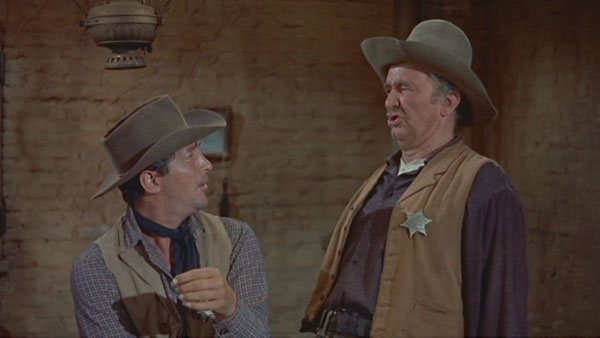
Now Joe’s in jail and every bad dude in town is angry about it. The stage rolls into town carrying Wayne’s old buddy Ward Bond (a John Ford regular), hot chick Angie Dickinson (China Gate, Point Blank, elevator victim in Dressed To Kill) and quickdraw Ricky Nelson (teen idol and TV star). Ward offers to help, Wayne turns him down but a few hours later Ward is shot anyway.
The late Ward, and Wayne who has a colorful shirt for every occasion:
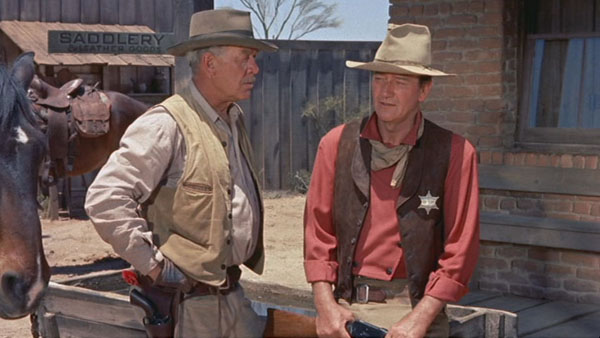
Ricky and Angie:

Eventully badass Burdette (John Russell of The Sun Shines Bright) shows up to help his brother (Claude Akins of The Killers, Merrill’s Marauders). Plans to raid the jail are derailed when they hear Walter will happily blow away the brother if anyone tries anything.
L-R: Walter, a jailed brother, a badass

Action! Dean is kidnapped, Helpful hotel owner Carlos and his wife are kidnapped, shootouts on the street and in the hotel, Walter Brennan gets to use that shotgun, Ricky and Dean each sing us a song, movie ends with a suspenseless comic scene, our heroes all tossing dynamite at the building where Burdette has holed up, shooting and laughing – not the kind of grim, fateful finale you usually get in a violent western. So right, I don’t know what kind of Hawksian analysis the critics apply to scientifically prove this film’s greatness, but I sure thought it was a tootin’ good time.

















